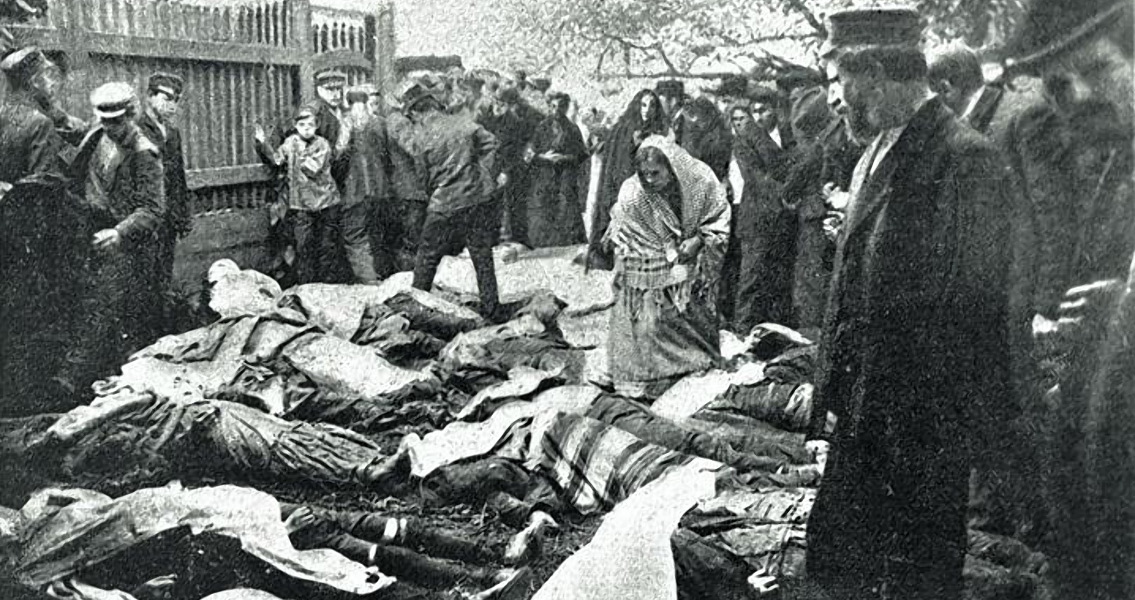<![CDATA[The streets of the Polish city of Bialystok descended into horrifying anti-Semitic violence on 14th June 1906, as mobs stormed the city's neighbourhoods, attacking the Jewish population and vandalising Jewish owned businesses. Now known as the Bialystok Pogrom, the event is a tragic example of political policy triggering horrendous violence. More than 80 (some sources claim up to 200) Jews had been killed by the time the chaos on the streets of Bialystok came to an end. Many have since argued that rather than being a random outburst of violence, the events in the city, which was then a part of the Russian Empire, were in fact the result of attempts by the Russian government to divide anti-Tsarist opposition. In 1906, Bialystok was a politically and socially diverse place. Three quarters of its population, around 50,000 people, were Jewish. At the same time, it was home to a substantial group of anarchists and socialists, making it a hotbed of revolutionary activity. Some sections of the city, such as Suraz Street, were so firmly under the control of anarchist groups that police refused to enter them. Anti-Semitic feeling spread;. anarchists launched attacks on Jewish owned businesses, while the Russian police and army became increasingly disillusioned and resentful towards the Jewish population. The murder of the city's police chief, Derkacz, on 11th June provided the tipping point that finally ignited the precarious situation. A Polish liberal who enjoyed the support of both the Jewish population and the city's Polish socialists, Derkacz used the police force to deter pogroms in the city. Most notably, when Russian soldiers had attacked Jews in the city's market place, he deployed his police officers to break up the fighting, declaring a pogrom would only happen in the city "over his dead body". Some sources have claimed that Derkacz's death was organised by the city's Russian commissar, Szeremietiev, as part of a conspiracy to eradicate his rival for authority. Although this has never been confirmed, the effect was clear, a powerful figure protecting the city's Jewish population had been removed. Three days later, on Corpus Christi day, violence erupted. Two processions, one Orthodox Christian, one Catholic, were held on the city streets. A bomb was launched at the Catholic procession, while shots were fired at the Orthodox one. Almost instantly people turned on the Jewish population, believing them responsible for the attack. Thugs stormed the streets, attacking Jews with knifes and crowbars. Russian soldiers, far from maintaining order, either allowed the violence to take place or became active participants themselves. Jewish defence units took to the streets to protect several Jewish neighbourhoods in the city, fighting off pogromists and likely saving hundreds of lives. After three days, the Russian Minister of Internal Affairs instructed regional governors to end the pogroms. Tellingly, perhaps, the violence came to a sudden halt, the pogrom ending abruptly once the Russian soldiers had left the city. Since the pogrom, sources have increasingly brought into question the idea it was just a random outburst of irrational violence. Immediately afterward, the Russian government attempted to blame the attacks on Bialystok's Polish population, essentially portraying it as a clash between two groups which also happened to be anti-Tsarist. This reporting of the events was undermined by Jewish survivors however, who described members of the city's Polish population providing shelter and not actively participating in the violence. Later, a Polish Jewish leader named Apolinary Hartglas claimed to have obtained secret documents issued by Szeremietiev, which proved the pogrom had actually been organised well in advance. These sources supposedly showed that Russian authorities had transported railroad workers from the Russian countryside to Bialystok to participate in the riot. Combined with the build up of Russian soldiers in the city immediately prior to the Bialystok Pogrom, it adds credence to the idea the Russian government had actually played a role in instigating the tragic events.]]>
Conspiracy and Anti-Semitism Lead to Bialystok Pogrom
